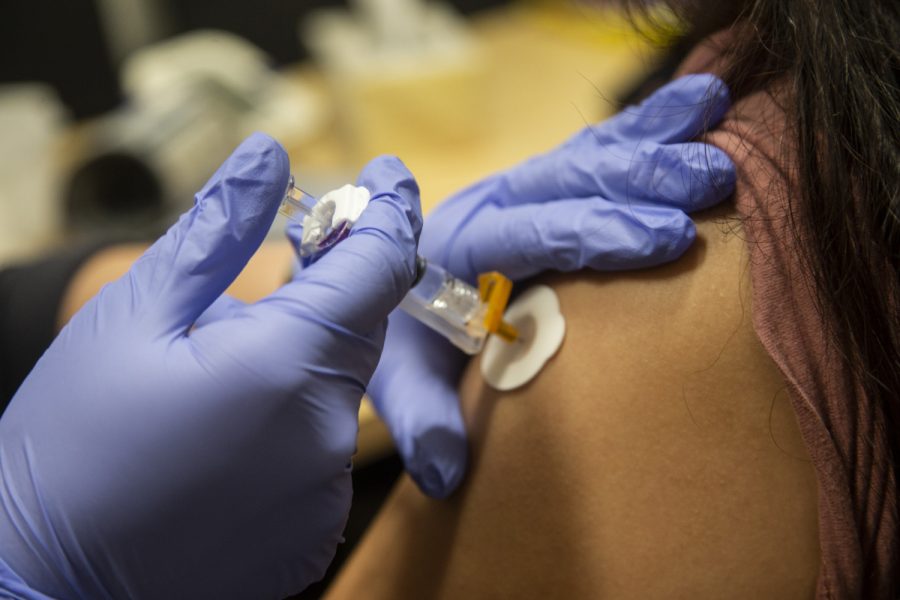University of Iowa Hospitals and Clinics prepares for COVID-19 vaccine expected in November
As the site of one of the Pfizer coronavirus vaccine trials, University of Iowa Hospitals and Clinics says they expect to distribute the vaccine in the third week of November.
Photo Illustration by Katie Goodale
October 25, 2020
The University of Iowa’s lead COVID-19 vaccine responder Brooks Jackson says the coronavirus vaccine may be ready as early as the middle of November. However, it will take a few months before everyone will have access to vaccination.
Since the start of the pandemic, health care workers and governmental officials have been working to treat the disease using a variety of methods, including a vaccination. President Trump said on Oct. 21 that the coronavirus vaccine will be ready soon, and he expects the entire population to have the vaccine by June of next year.
With the upcoming election in November, some are skeptical about the validity of this statement.
“I think that any politician who’s saying that a vaccine trial is going to be ready within a matter of weeks is making a desperate attempt to stay relevant and stay in power. If the vaccine is successful at building the antibodies and doing what it’s intended to do, it’s not going to be ready by the end of the year,” Cedar Rapids City Councilor Ashley Vanorny said. “I don’t foresee that happening until spring or the summer.”
Vanorny is a participant in University of Iowa Hospitals and Clinics’ Pfizer vaccine trial. She said she has appointments into next year to receive injections and safety checks for the trial.
But, health experts say, there are good signs that a vaccine could be available to critical populations in a matter of weeks. Jackson, dean of the UI College of Medicine and the UI’s vice president for medical affairs said there’s a good chance for the Pfizer vaccine to be ready this year — perhaps in as little as two to four weeks. As one of the leaders in vaccine distribution, Jackson said they are preparing for the freezers to store the vaccine, which will arrive Oct. 26.
Jackson said the Pfizer vaccine trial has moved faster than any previous trials for vaccines, which may be why people are skeptical that the vaccine will be ready so soon. He said there are a couple of reasons why this vaccine will be ready this year.
“This new virus is causing a significant amount of hospitalizations and mortality,” Jackson said. “Additionally, the technology has advanced incredibly quickly from being able to come up with a vaccine within a couple of months.”
With the successes from the first two phases of the trial, the Pfizer vaccination should be safe after receiving emergency approval from the Food and Drug Administration in a few weeks, Jackson said.
RELATED: Johnson County Board of Health prepping for COVID-19 vaccine
Jackson said Pfizer expects to determine the efficacy of this vaccine as early as next week, but they want at least half of the trial subjects to have received their second dose of the vaccine at least two months before they release it to the public.
Despite the vaccination being ready as early as the middle of November, it will be a few more months until everyone could receive the vaccine, Jackson said.
“Ultimately anyone who wants it, we would want to give it to,” Jackson said. “We don’t have millions of doses right away, and even if we did, it would be very difficult to get them all in a month.”
Jackson said UI Hospitals and Clinics expects to receive a small amount of vaccines, meaning they are working to prioritize who receives the vaccine first.
As previously reported by The Daily Iowan, the Johnson County Department of Public Health is preparing to distribute the vaccination to health care workers first.
Johnson County Public Health Emergency Preparedness Planner Steven Button said because there won’t be millions of vaccines right away, Johnson County Public Health is working with UIHC to provide the vaccination to the most vulnerable people.
“There is initial speculation that this will be the critical workforce that provides health care and maintains essential functions of society, as well as, staff and residents of long-term care and assisted living facilities,” Button said. “National pharmaceutical chains will work with the CDC to provide vaccination services directly to long-term care facilities to vaccinate residents and staff.”
Vanorny said it’s important for people to get the coronavirus vaccine as soon as it’s available.
“It’s the only way that we’re going to return to whatever our new normal looks like,” she said. “Until we have enough people who are vaccinated and can get COVID under control, we’re not going to get back to things we love, like concerts and large gatherings.”
RELATED: Why an Iowa City hotspot could help UI researchers more effectively study a COVID-19 vaccine
Jackson said no vaccine works for every person, but they work for most. The neutralizing antibodies and the cellular immunity needed to protect the body against the infection and symptomatic disease are present in this vaccine, he said.
Once the vaccination is available and distributed to the entire population, Jackson said he is confident that the virus will be under control.
“I’m very optimistic that we will be able to control this virus through vaccines and treatments,” he said. “Right now, we’re seeing sort of a surge in Iowa. The sooner we get a vaccine, the better. I do think there are good reasons to be optimistic about this.”






